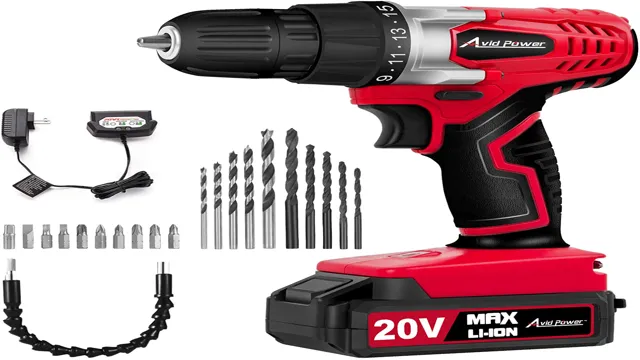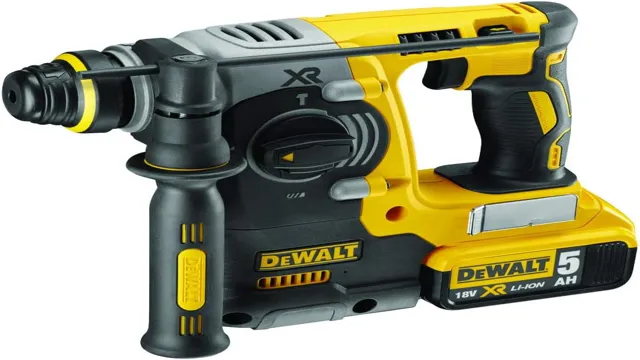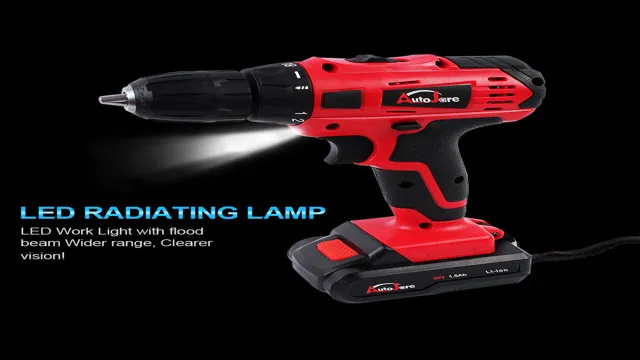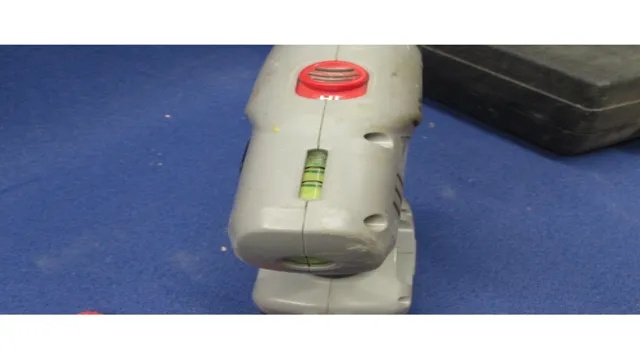Are Corded Drills More Powerful Than Cordless? Exploring The Pros and Cons
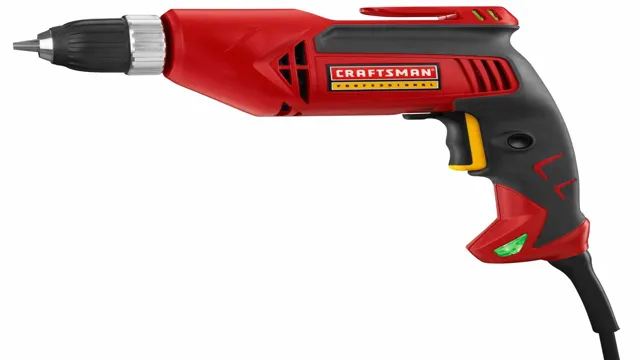
Drills are essential tools for any DIY enthusiast or professional contractor. They come in two main varieties, corded and cordless. The choice between the two depends on your personal preference and the task at hand.
While both types of drills serve the same purpose, there are differences in power and convenience that make one better suited for certain tasks than the other. In this blog post, we will compare the power of corded drills and cordless drills to help you make an informed decision and choose the right one for your needs. Are you ready to learn which one will be your go-to drill for your next project? Let’s get started!
Introduction
If you’re looking for power in a drill, then it’s not uncommon to wonder which type of drill is more powerful- a corded or cordless drill. The truth is, corded drills are generally more powerful than cordless ones. That’s because they are connected directly to a power source via an electrical cable, which provides non-stop power and makes them ideal for tougher tasks like drilling holes in hard materials, such as concrete or steel.
Cordless drills, on the other hand, rely on a battery for power, which can lead to decreased performance as the battery runs down. However, corded drills are typically bulkier and less portable than cordless drills, which might be a dealbreaker for people who value convenience. In summary, if you need a tool with sustained high power output for tough jobs, a corded drill might be your best bet.
Explanation of corded and cordless drills
Corded and cordless drills are two essential tools for any DIY enthusiast, as they are both versatile and efficient. Corded drills are powered by electricity and require a power outlet to function properly. They offer more power than cordless drills and are not limited by battery life.
Therefore, corded drills are best suited for heavy-duty drilling tasks that require a lot of power, such as drilling into thick and dense materials like concrete and hardwood. On the other hand, cordless drills are powered by rechargeable batteries, making them more portable and convenient to use. They are best for light to medium drilling tasks, such as drilling into drywall or wood.
Cordless drills are also suitable for working in tight and hard-to-reach spaces where access to a power outlet is limited. However, the battery life of cordless drills can be a limitation, as they need to be recharged occasionally. Overall, whether to opt for a corded or cordless drill depends on the task at hand and personal preference.
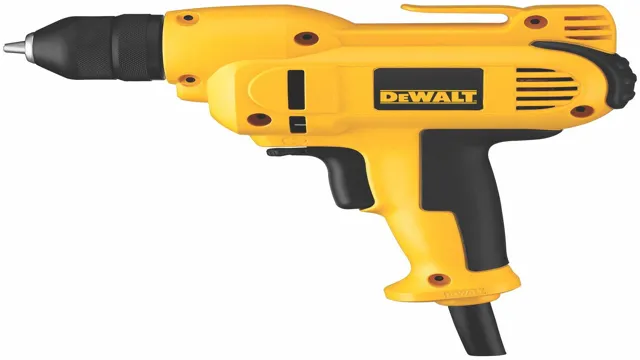
Purpose of the blog post
The purpose of this blog post is to shed light on the importance of maintaining a healthy work-life balance. In our fast-paced society, many people tend to prioritize their work above everything else. While it’s important to work hard, it’s equally important to find a balance between work and personal life.
After all, our personal lives are just as important as our professional ones. Striking a balance between the two can improve both our mental and physical well-being, leading to a happier and more fulfilling life. So, let’s explore some tips and tricks on how to maintain a healthy work-life balance.
As we strive to achieve professional excellence, it’s easy to lose sight of our personal lives. Working long hours, neglecting our health, and neglecting loved ones can lead to burnout and other health problems. By finding a balance between work and personal life, we can enjoy the best of both worlds.
There are many ways to achieve this balance, such as setting realistic work goals, taking breaks throughout the day, and prioritizing time for friends and family. When we prioritize our physical and mental health, we can enhance our productivity, creativity, and overall well-being. In conclusion, maintaining a healthy work-life balance is vital for our mental, physical, and emotional well-being.
By doing so, we can achieve professional success while still valuing our personal lives and relationships. It’s not always easy to balance the two, but with practice and mindfulness, we can discover our own work-life harmony. So, let’s prioritize our well-being and find the balance that works for us.
Power Difference
Many people wonder if corded drills are more powerful than cordless ones. The answer isn’t as simple as a yes or no. It’s important to note that corded drills are typically more powerful due to being plugged into a power source directly, offering a constant flow of electricity without the limitations of battery life.
However, cordless drills have come a long way in recent years and can be just as powerful as their corded counterparts with newer technology and larger batteries. It ultimately comes down to the specific model and intended use. For heavy-duty jobs such as drilling through tough materials like concrete, a corded drill may be the better choice.
But for everyday use such as hanging shelves or assembling furniture, a cordless drill may suffice, providing the convenience of portability and ease of use. In short, it’s essential to consider your needs before making a decision on which type of drill to purchase.
You May Also Love:
Statistics on power output of corded drills
When it comes to choosing a corded drill, the power output is a crucial factor to consider. The power of a drill is measured in amps and can affect its performance, durability, and versatility. Statistics show that corded drills can produce power output ranging from 2 to 15 amps.
A higher amp rating means a more powerful drill that can handle tougher jobs, but it also means a heavier and bulkier tool. However, it’s essential to note that power output isn’t the only factor to consider when selecting a corded drill. Other features like chuck size, speed settings, and ergonomics can also affect your experience using the drill.
So, before purchasing a corded drill, it’s important to determine the type of project you’ll be working on and choose a drill that can meet your needs.
Statistics on power output of cordless drills
When it comes to power output, cordless drills can vary greatly in their capabilities. It’s important to understand the differences in power if you want to choose the right tool for your needs. Generally, power is measured in volts (V) and the higher the voltage, the more power the drill has.
For example, a 12V cordless drill may be sufficient for smaller DIY jobs, while a 20V or higher drill is better suited for heavy-duty tasks. However, it’s not just about voltage. The motor design and battery capacity also play a role in power output.
Some drills may have a lower voltage but still deliver a high torque output, making them more suitable for drilling through tough materials. Make sure to consider all of these factors when choosing a cordless drill to ensure you get a tool that meets your power needs.
Explanation of why corded drills are more powerful
When it comes to corded drills, one of the first things people notice is their incredible power. But why exactly are corded drills so much more powerful than their cordless counterparts? The answer lies in their power source. Corded drills are powered by electricity that is delivered directly from an outlet.
This constant stream of power allows corded drills to maintain a higher level of torque and speed for longer periods of time. In contrast, cordless drills rely on battery power, which can fluctuate in strength as the battery drains. This can result in a decrease in speed and power over time, especially if the battery is not fully charged.
Furthermore, the type of battery used in cordless drills also plays a role in their power output, with some batteries delivering more power than others. In summary, corded drills are more powerful because they have a constant and reliable source of electricity, whereas cordless drills rely on battery power which can diminish over time.
Advantages of Corded Drills
When it comes to power, corded drills generally have an advantage over their cordless counterparts. This is because corded drills are powered by a continuous electrical source, whereas cordless drills rely on a battery that can run out of charge. Additionally, corded drills typically have higher voltage options, which translates into more power and torque for tougher jobs.
This means that if you’re looking for a tool that can handle heavy-duty projects or work for extended periods of time, a corded drill might be the better option. However, it’s important to note that corded drills also come with their own set of drawbacks such as limited mobility and the need to be plugged in at all times. Ultimately, the choice between corded and cordless drills depends on your specific needs and preferences.
But if you’re looking for maximum power and reliability, corded drills are definitely worth considering. So, to answer the question “are corded drills more powerful than cordless?”, the answer is a resounding yes!
Extended use without recharging
Corded drills have been around for a while and have been the tool of choice for many DIY enthusiasts and professionals for a good reason. These tools have an extended use without recharging. You can use them efficiently for extended periods without the need to worry about the battery life.
Unlike their cordless counterparts, they do not need a battery swap, a recharge, or to slow down as it loses power. This feature makes them highly reliable and efficient, especially when dealing with heavy-duty tasks that require continuous high power. Plus, the corded drills are generally more powerful than their cordless alternatives, making them ideal for tasks like drilling through thick metal or hardwood.
If you’re working on a project that requires some heavy drilling, a corded drill might be the best tool for the job. Not only will it give you a high level of power, but it will also ensure that you can work without interruption. Don’t forget to do regular maintenance on your corded drill to make sure it operates as it should and lasts as long as possible.
More consistent power output
Corded drills have many advantages over cordless drills, and one of the greatest benefits is their more consistent power output. Because corded drills are powered by electricity, they don’t suffer from the same battery issues that cordless drills do. With a corded drill, you don’t have to worry about the battery running low in the middle of a project, causing the drill to lose power and potentially damage your workpiece or even cause injury.
Additionally, corded drills typically have more power than their cordless counterparts, giving you greater control and precision when drilling into tough materials like concrete or metal. So, if you’re looking for a reliable, powerful drill that won’t let you down when you need it most, a corded drill is definitely the way to go.
Can handle larger drill bits
Corded drills offer several advantages over their cordless counterparts, including the ability to handle larger drill bits. While cordless drills may be more convenient, they often lack the power necessary to handle heavy-duty jobs. Corded drills, on the other hand, are designed to handle tough materials and larger drill bits with ease.
This makes them an excellent choice for professionals who need a reliable tool for big jobs. Additionally, corded drills are often more durable and long-lasting than battery-operated drills, making them a smart investment for anyone in need of a high-quality power tool. So, if you’re looking for a drill that can tackle tough materials and handle larger bits, a corded drill may be the right choice for you.
Advantages of Cordless Drills
When it comes to the debate between cordless and corded drills, one common question that arises is whether corded drills are more powerful than cordless drills. The answer to this question largely depends on the specific model and brand being compared, but in general, corded drills do have more consistent and reliable power due to their constant connection to an electrical outlet. However, this does not mean that cordless drills are inherently less powerful.
In fact, many modern cordless drills now come with lithium-ion batteries that provide long-lasting, high-performance power. With a cordless drill, you also have the freedom to work in areas without a power source or to move around freely without being tethered to an outlet. Additionally, cordless drills are often more lightweight and portable, making them easier to carry and use for prolonged periods without experiencing fatigue.
Ultimately, the decision on whether to choose a corded or cordless drill should come down to your specific needs and preferences. If you prioritize power, consistency, and extended use, a corded drill may be the way to go. However, if you value mobility, versatility, and convenience, a cordless drill may be the better option for you.
Portability and convenience
Cordless drills are perfect for anyone who needs a portable and convenient tool. Whether you’re a DIY enthusiast or a professional contractor, the advantages of cordless drills can’t be overstated. With no cords to worry about, you can take your cordless drill wherever you need it, without worrying about finding a nearby power outlet.
Plus, cordless drills are much lighter and more compact than their corded counterparts, making them easier to handle and use in tight spaces. Imagine being able to work on a project anywhere in your home or workshop, without having to drag around a heavy, cumbersome tool. That’s the beauty of cordless drills!
No cord to get tangled up in or limit range of motion
Cordless drills have quickly become the go-to tool for any DIY or construction project. One of the key advantages of cordless drills over their corded counterparts is the freedom they provide. With no cord to get tangled up in or limit range of motion, users can easily move around and work where they need to.
This is especially beneficial for working on ladders or in tight spaces where a cord might get in the way. Additionally, cordless drills are lightweight and more compact than corded drills making them easier to transport and use in on-site work. So, if you’re looking for a convenient, versatile and easy-to-use drill, a cordless drill is definitely the way to go!
Conclusion
In the age-old battle between corded and cordless drills, it’s tempting to assume that the corded variety always takes the cake when it comes to power. And while it’s true that corded drills have historically been known for their might, cordless technology has come a long way in recent years. Nowadays, there are plenty of powerful cordless drills on the market that can give their corded counterparts a run for their money.
So, in the end, it all comes down to personal preference and what kind of project you’re tackling. Are corded drills generally more powerful than cordless ones? Maybe. But can cordless drills hold their own and provide the convenience of mobility? Absolutely.
So choose your weapon wisely, and let the drilling commence!”
Overall verdict on power comparison between corded and cordless drills
Advantages of Cordless Drills Cordless drills have several advantages over their corded counterparts. The most significant advantage is their portability. With a cordless drill, you can move around freely without the restrictions of a power cord.
You don’t have to worry about finding a nearby electrical outlet or tripping over a cord while you work. This makes a cordless drill ideal for outdoor projects or remote job sites where electricity is not available. Another advantage of cordless drills is their convenience.
You can quickly grab your drill and start working without the hassle of plugging it in or untangling a cord. Plus, cordless drills are lightweight and easy to handle, so you can work for extended periods without experiencing fatigue. Cordless drills are also versatile.
Most cordless drills come with a variety of attachments and accessories that allow you to drill, screw, and bore holes in different materials. You can easily switch between functions, making your work quick and efficient. Finally, cordless drills are powerful.
While they may not be as powerful as corded drills, cordless drills have improved significantly over the years. They can handle most DIY projects without any problems. In conclusion, cordless drills offer several advantages over corded drills.
They are portable, convenient, versatile, and powerful, making them an excellent choice for anyone who wants a reliable and easy-to-use drill.
Factors to consider when choosing between the two
When it comes to choosing between a corded and a cordless drill, there are a few factors to consider. However, cordless drills have a range of advantages that make them a popular choice among DIY enthusiasts and professionals alike. One such advantage is the flexibility they offer.
With a cordless drill, you aren’t tied to a power socket, so you can work in any corner of your workshop or job site without worrying about the nearest power outlet. Furthermore, the recent advancements in battery technology mean that cordless drills can now be used for extended periods, without frequent recharging. Another advantage of cordless drills is their portability.
As they don’t rely on a power cord, they are much easier to transport and store, making them a great option for anyone who needs to move their tools around regularly. In conclusion, while corded drills have their uses, for most people, cordless drills are the best option due to their flexibility and portability.
FAQs
What is the main difference between corded drills and cordless drills?
The main difference is that corded drills are powered by electricity through a cord while cordless drills are powered by rechargeable batteries.
Can corded drills provide more power compared to cordless drills?
Yes, corded drills generally have more power than cordless drills since they are directly connected to a power source.
What are the advantages of using a corded drill over a cordless one?
Corded drills can provide constant power, making them more suitable for heavy-duty tasks and prolonged use. They are also generally cheaper than cordless drills.
Are there any disadvantages of using corded drills?
The biggest disadvantage is that they are limited by the length of the cord, which can restrict movement and flexibility. They are also not as portable as cordless drills.
What are the advantages of using a cordless drill over a corded one?
Cordless drills are highly portable and can be used anywhere without the need for a power source. They are also more versatile since they can be used in tight spaces where a corded drill may not fit.
Can cordless drills provide enough power for heavy-duty tasks?
Yes, some high-end cordless drills can provide sufficient power for heavy-duty tasks, but they may not last as long as corded drills since the battery will eventually run out.
How long do cordless drill batteries typically last?
It depends on the usage and the quality of the battery, but most cordless drill batteries can last anywhere from 1-2 hours on a single charge.

